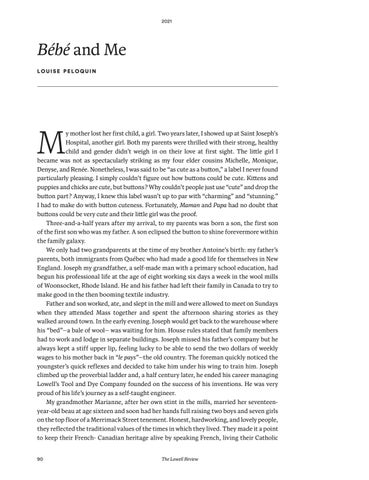2021
Bébé and Me louise peloquin
M
y mother lost her first child, a girl. Two years later, I showed up at Saint Joseph’s Hospital, another girl. Both my parents were thrilled with their strong, healthy child and gender didn’t weigh in on their love at first sight. The little girl I became was not as spectacularly striking as my four elder cousins Michelle, Monique, Denyse, and Renée. Nonetheless, I was said to be “as cute as a button,” a label I never found particularly pleasing. I simply couldn’t figure out how buttons could be cute. Kittens and puppies and chicks are cute, but buttons? Why couldn’t people just use “cute” and drop the button part? Anyway, I knew this label wasn’t up to par with “charming” and “stunning.” I had to make do with button cuteness. Fortunately, Maman and Papa had no doubt that buttons could be very cute and their little girl was the proof. Three-and-a-half years after my arrival, to my parents was born a son, the first son of the first son who was my father. A son eclipsed the button to shine forevermore within the family galaxy. We only had two grandparents at the time of my brother Antoine’s birth: my father’s parents, both immigrants from Québec who had made a good life for themselves in New England. Joseph my grandfather, a self-made man with a primary school education, had begun his professional life at the age of eight working six days a week in the wool mills of Woonsocket, Rhode Island. He and his father had left their family in Canada to try to make good in the then booming textile industry. Father and son worked, ate, and slept in the mill and were allowed to meet on Sundays when they attended Mass together and spent the afternoon sharing stories as they walked around town. In the early evening. Joseph would get back to the warehouse where his “bed”—a bale of wool— was waiting for him. House rules stated that family members had to work and lodge in separate buildings. Joseph missed his father’s company but he always kept a stiff upper lip, feeling lucky to be able to send the two dollars of weekly wages to his mother back in “le pays”—the old country. The foreman quickly noticed the youngster’s quick reflexes and decided to take him under his wing to train him. Joseph climbed up the proverbial ladder and, a half century later, he ended his career managing Lowell’s Tool and Dye Company founded on the success of his inventions. He was very proud of his life’s journey as a self-taught engineer. My grandmother Marianne, after her own stint in the mills, married her seventeenyear-old beau at age sixteen and soon had her hands full raising two boys and seven girls on the top floor of a Merrimack Street tenement. Honest, hardworking, and lovely people, they reflected the traditional values of the times in which they lived. They made it a point to keep their French- Canadian heritage alive by speaking French, living their Catholic 90
The Lowell Review

